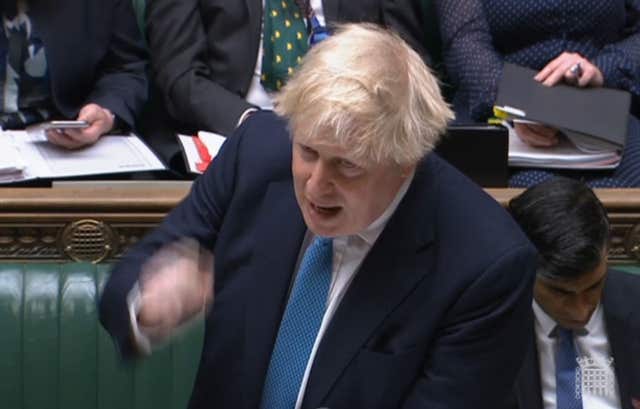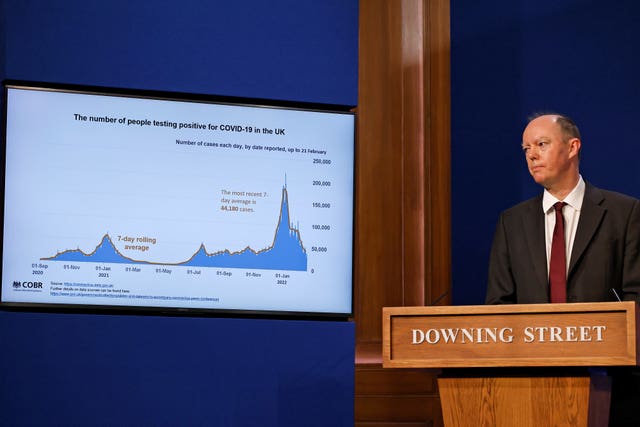Legal requirement to isolate with Covid-19 comes to an end
Boris Johnson set out the strategy for ‘living with Covid’ earlier this week.

All coronavirus laws in England including the legal requirement for people who test positive to isolate will end on Thursday.
On Monday, Prime Minister Boris Johnson set out the strategy for “living with Covid”, which also includes plans to scrap free universal testing in April.
Those who receive a positive Covid-19 test will still be advised to stay at home for at least five days, but from today will not be obliged to under law.
An Ipsos survey of 1,018 people aged 16-75 found that 46% of those polled believe that the Government is relaxing coronavirus restrictions too quickly, while 39% believe it is about the right time.

The survey found that 49% of people do not support the end of legal self-isolation for those testing positive for Covid, while 33% of those polled do support the end of the legal requirement.
Almost four in 10 Britons surveyed said it is likely they will go to the shops (37%) even if they have tested positive for Covid, and the same proportion of workers feel they would go into work if they were positive.
The survey found that 24% said it is likely they would travel on public transport if they had tested positive, while 20% said they would visit elderly relatives.
More than half of those polled (52%) said it is likely that they would go for a walk outside if they had tested positive for the virus.
Just 29% of those surveyed support the decision to no longer provide free Covid-19 test kits.
Keiran Pedley, at Ipsos, said: “While the public are divided on whether or not this is the right time for the Government to relax Covid-19 restrictions, it’s clear that the decision to stop providing free Covid-19 tests to anyone who requests them is not a popular one.
“It is notable that British workers are split on whether they would go into work even after testing positive which may have implications for plans to get people back into offices.”
Routine contact tracing will also end on Thursday, as will the £500 self-isolation payments and the legal obligation for individuals to tell their employers about their requirement to isolate.
Changes to statutory sick pay and employment support allowance designed to help people through the coronavirus pandemic will end on March 24.
People aged 75 and over, the immunosuppressed and those living in care homes will be offered another Covid-19 booster vaccine this spring under the plans.
Free universal testing will be massively scaled back from April 1 and will instead be focused on the most vulnerable, with the UK Health Security Agency set to determine the details, while asymptomatic testing will continue for social care staff.
On Monday, England’s chief medical officer Professor Sir Chris Whitty said people should still isolate if they have Covid-19 despite the legal requirement ending.
He said it is “standard public health advice” as he warned that while rates are coming down it is “still a very common infection”.

Mr Johnson acknowledged there is likely to be another variant that will “cause us trouble”, saying he did not want people to think “there’s some division between the gung ho politicians and the cautious, anxious scientists”.
He said: “The most important thing is that – and I hope this is the big take-out from this – the sun is shining but we’re keeping our umbrella.”
But the British Medical Association warned that the “living with Covid” strategy “fails to protect those at highest risk of harm from Covid-19, and neglects some of the most vulnerable people in society”.
Groups representing vulnerable individuals also sounded the alarm over the end to isolation laws, with the Scope disability equality charity saying it would usher in a life “living with fear”.
Blood Cancer UK warned that the plan “will cause huge anxiety among immunocompromised people and leave many of them feeling abandoned”, while the MS Society said the scrapping of free universal testing is “not only reckless but dangerous”.
Meanwhile, public transport users in London will no longer be required to wear face masks from Thursday.
Transport for London announced that face coverings will stop being a condition of carriage following the “shift in the Government’s approach” towards living with coronavirus.
It added that “decreasing infection rates in London” were also a factor in its decision.





